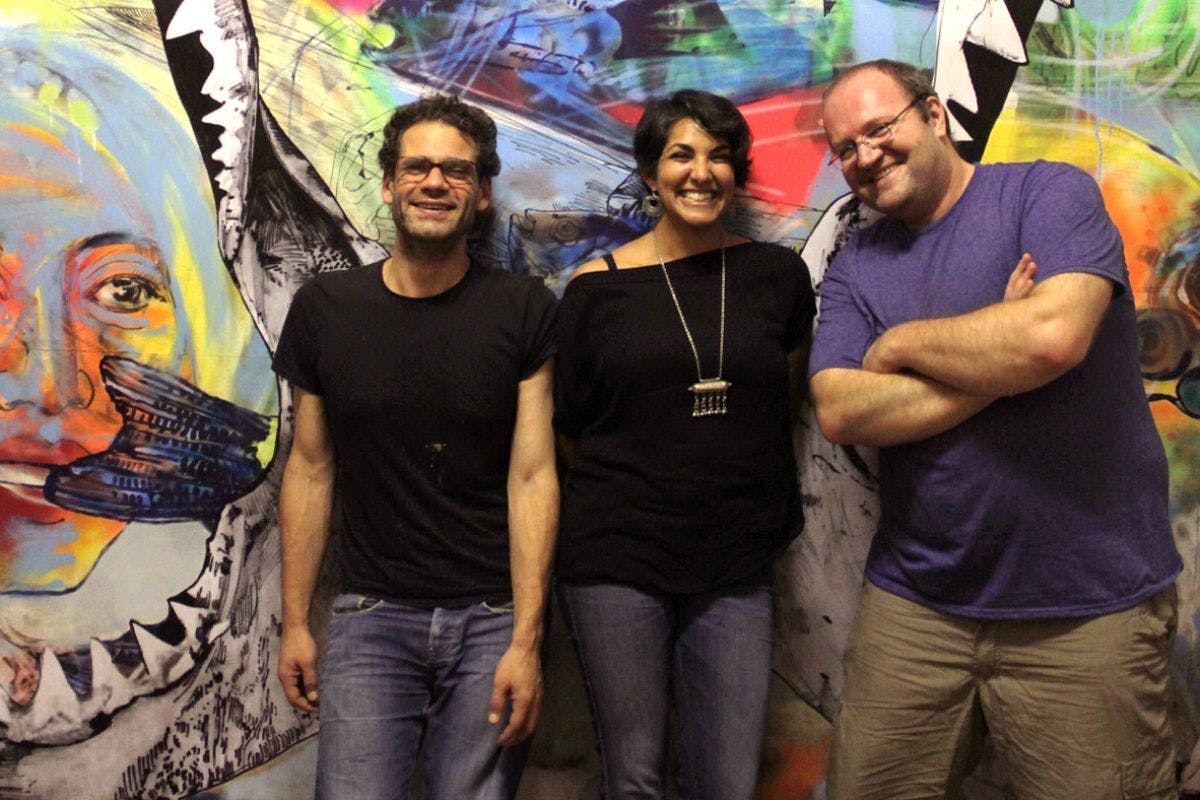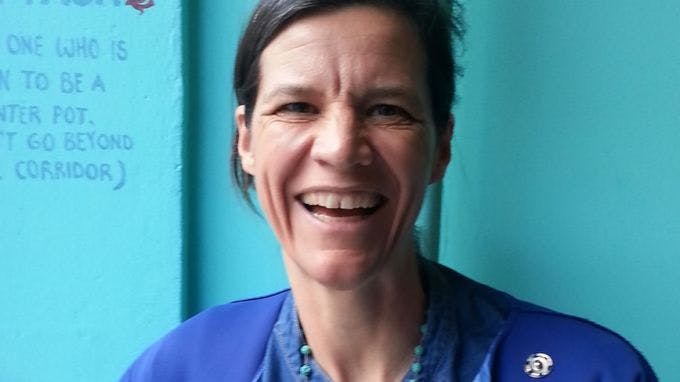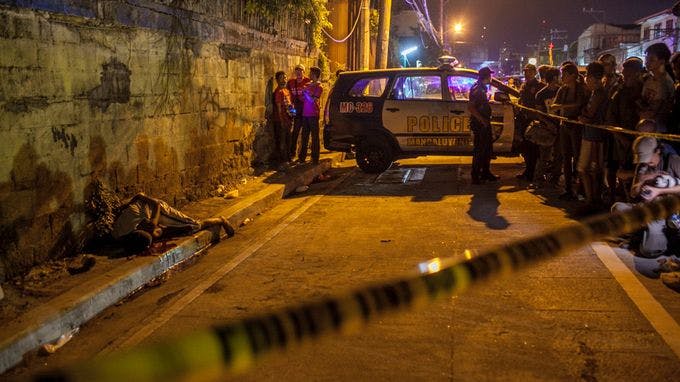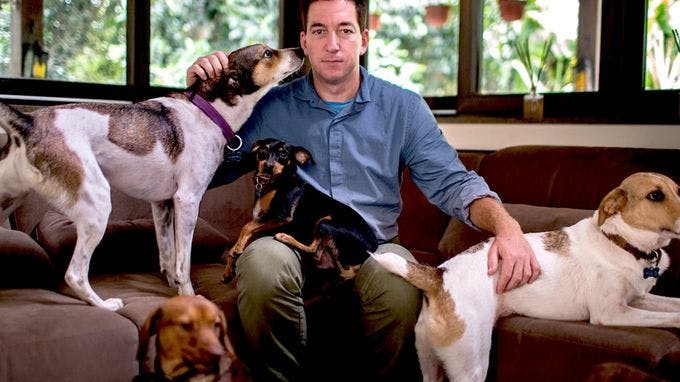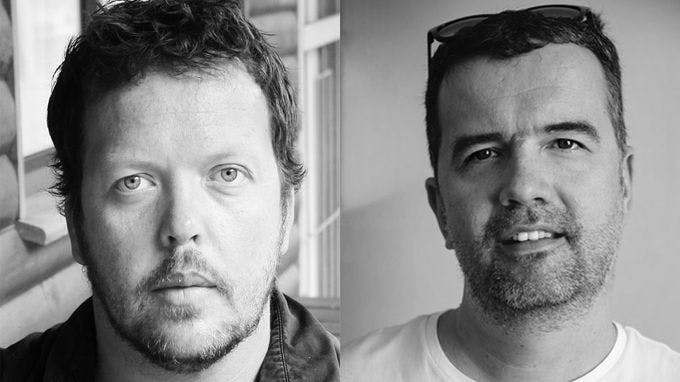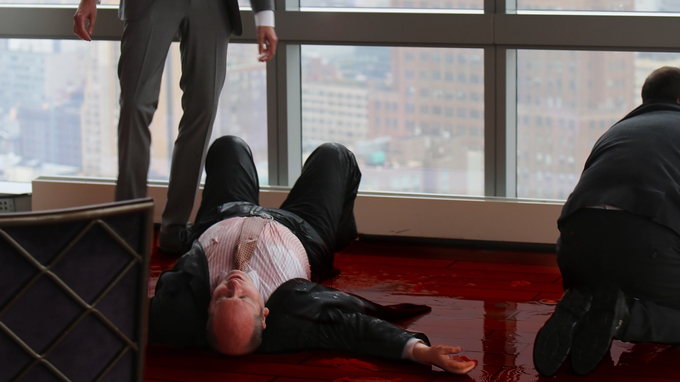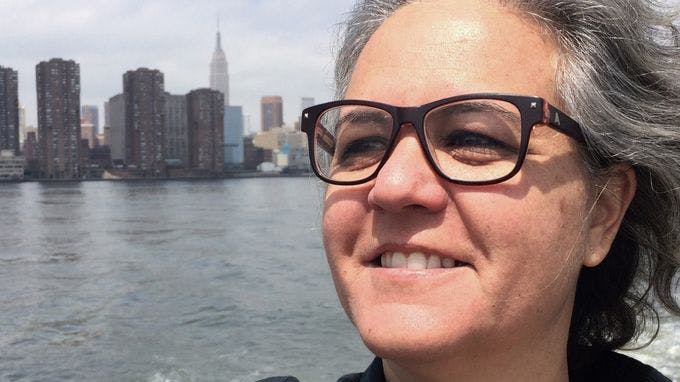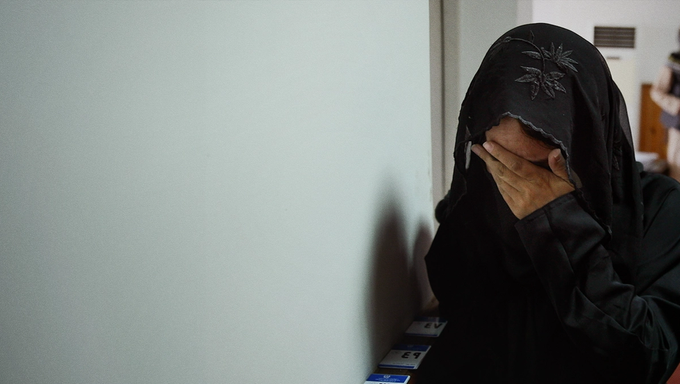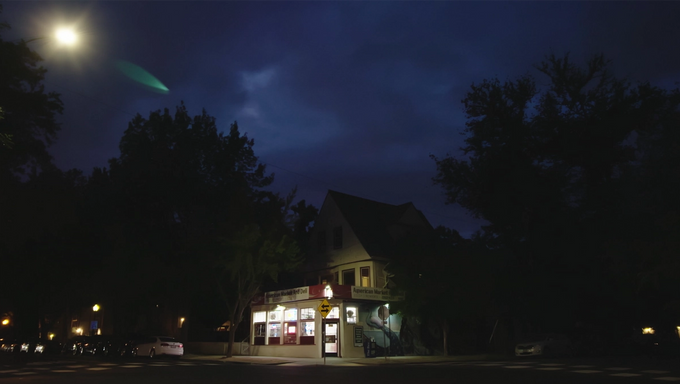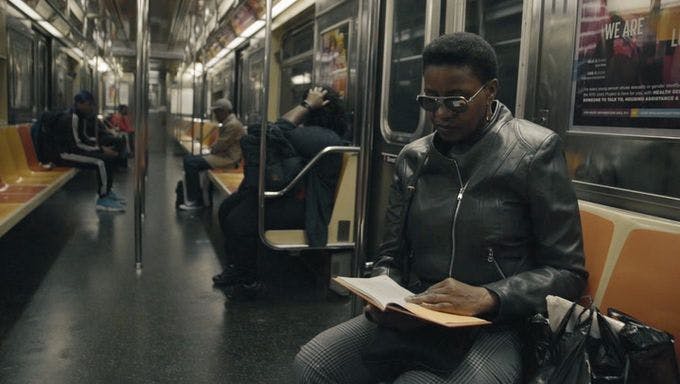Commissioned to apply realistic graffiti to sets for the popular Showtime series Homeland, three artists and activists took the opportunity to critique their employer by painting satirical and damning phrases in Arabic — such as “Homeland is NOT a series” and “Homeland is racist” — that nobody on the Homeland team seemed to notice. That is, until an episode that aired worldwide in October was watched by viewers who could read Arabic. Within days, the political prank became an international media sensation.
The conspirators behind the Homeland hack, Heba Yehia Amin, Caram Kapp, and Don Karl, come from a diverse array of disciplines and backgrounds. Amin is a visual artist and professor born and based in Cairo; Kapp is a Cairo-born, Berlin-based graphic designer and multimedia artist; and Karl is a Berlin-based graffiti writer and author. When the following interview was conducted, kaleidoscopically via Google Hangout, the trio was collaborating on the edit for Homeland Is Not a Series from three separate cities.
In anticipation of bringing this latest iteration of their project to Field of Vision, the “Arabian Street Artists,” as they cheekily refer to themselves, talked about the effectiveness of humor as a weapon against intolerance, the challenges of making a movie when they don’t consider themselves filmmakers by trade, and how they’re trying to foster further discussion around Western representations of Middle Eastern culture.
So how did this start? Since you’re all coming from slightly different disciplines, as well as different areas of the world — how did you wind up collaborating on this covert sabotaging of the Homeland TV show?
Don Karl: I got a call from Homeland that they were looking for “Arabian street artists.” I reached out to several artists, and one of them was Caram, with whom I worked on several other projects — including Walls of Freedom a book about graffiti art and the Egyptian revolution. We gathered in front of a street art exhibit in Berlin, which is where I met Heba for the first time, and the question was, “Do we want to do this kind of thing? Do we need money so urgently that we need to work for Homeland?”
Heba Yehia Amin: None of us were certain that we wanted to work with them. In fact, Don struggled to find people who actually wanted to take on this job, because we so strongly oppose the politics of this show.
Karl: We had this idea spinning around that we could sabotage them, but it wasn’t really concrete.
Amin: We decided at that point to at least meet with the set designers, and see exactly that they wanted us to do. It turned out that it was a much easier set up than we thought it would be. In fact, they came with references for us — they brought images of what they wanted this graffiti to look like. And the images they brought us were of pro-Assad graffiti — they had no clue about the content of what they were showing us. So we already knew that they didn’t have a concrete idea of what they wanted us to write. They just wanted decoration on the set.
They basically said, “Write whatever you want, we just don’t want you to copy these references because of copyright issues. And oh yeah, we don’t necessarily want anything too political.” Then we discovered that there was no contract — they were making no agreement with us. So just in terms of our concerns about the legalities of doing something like this, we felt like this was really working in our favor. At that point we were really convinced about moving forward with this idea.
Caram Kapp: Visually, they did very good research. On a superficial level, the set is very convincing. When we went there, it was as if we were in parts of Lebanon. But obviously they didn’t know the deeper meaning of what they were talking about, and they’d either never talked to people from an Arab country or learned enough Arabic to be able to know what was actually going to be written on the set.
Did the three of you come up with the text for the graffiti together?
Kapp: Heba and I, and a lot of friends and relations helped us out. We asked them, “Can you send us quotes?” And we actually were prepared to do a less subversive job if the situation developed that way.
Karl: At first we worked with quotes that had double meanings — we were thinking of ways to insert the message very subtly. Then when we found that nobody looks at it, they started to write all those very blatant sayings.
Amin: Arabic proverbs in general have these double meanings, so if you don’t know the language you won’t understand the context of it. If you just take it for its literal face value, it won’t have the critical meaning we were after. But it turned out that we didn’t even need to be that subtle. So we basically improvised once we were on set. Caram and I were having a lot of fun with this, just writing really stupid stuff that was also attempting to undermine the show in a more comical way.
Now I’m not at all a graffiti artist, so that’s also comical, that I was brought on as a graffiti artist and had never held a spray can in my life. I’m very familiar with politically subversive artistic tactics, but it was interesting for me to be represented as this graffiti artist when that’s not what I am at all.
Karl: We were misinterpreted in all kinds of ways. We were called a collection of Muslim street artists, and that doesn’t fit any of us.
Amin: We’ve played with it. We named ourselves the Arabian Street Artists because when the set designers were communicating with us via email, they kept referring to us as the Arabian street artists. We found this quite funny.
Karl: I became an Arab, even though I’m so German.
Amin: We also played with it in the text itself. These Orientalist texts like 1001 Arabian Nights — like “1001 Jokes,” or “1001 Calamities.” We played with that Orientalist depiction that was imposed on us.
Kapp: Once we realized that we could get away with it, we started becoming really spontaneous. We began to tell more jokes after being very serious in the beginning. It was very liberating.
Did anybody notice what you were writing on the walls? Or is it something you had to reveal afterwards?
Karl: I heard from one guy, who was working on set and read it but didn’t tell anyone, because he hated the show himself. Maybe others saw it and didn’t tell. All these lawyers and people looking at every frame, hundreds of people looking at it before it airs, and they have not one person who understands or reads Arabic?
Amin: We were asked to write signs for these makeshift storefronts in this supposed refugee camp. And Caram came up with this really great sign for a falafel joint, where he wrote, “Falafel and Alcohol Made with the Hands of Faiza.” And in his mind he created this whole character of Faiza being a Christian Syrian refugee remembering the old times, this whole comical narrative of who the characters of the refugee camp are.
And the next day we got an email from the set designer and she said, “Somebody just told me that you wrote falafel and alcohol on the sign — why would you do that?” So Caram responds to her very seriously, and says, “Well, you know, this store belongs to Faiza from Syria,” and he gives her this whole backstory of who Faiza is to justify what he put on the sign. After this email we didn’t hear anything back so we were thinking they probably noticed all the other graffiti we put in there as well. So we weren’t sure that any of it was going to show up — that they would have covered it up or taken it out in postproduction.
But then the episode airs, and that’s not what happened at all.
Amin: We were caught off guard. None of us were prepared. I was in the airport when Caram and Don sent me screenshots of the episode. We decided that we needed to write a statement as quickly as possible, which the three of us put together in a day or two. Then we posted it on my website and shared it through social media, and within an hour we started getting messages. The first big paper that wrote about it was Time magazine — they sent me an email saying we want some feedback and before we could even write them back they posted the article. And from there it went viral in a matter of hours.
Kapp: After that it was three days of absolute media mayhem. The phone was ringing about 50 times an hour.
Karl: I gave a shaky handheld phone interview with somebody, I didn’t know who, and it turned out to be AJ+. Three million people saw it.
Kapp: I was brought into a studio interview, watching the news, and I thought to myself — there’s stuff erupting in Palestine, there’s Nigerian stuff going on at the same time, and this is the headline story from the Middle East?
Karl: It was discomforting in a way, but at least it was something to make people laugh.
Amin: It wasn’t just that we made people laugh — it was also a form of criticism. It was in keeping with a point we were making, the idea that media manipulates the narrative, how the region is depicted. The fact that we became a big story kind of furthered our point of what the focus is on in the region. We tried to use the opportunity to talk about those issues — about what consequences a show like Homeland and many others have on an entire region — and not just about our media hack.
Karl: It started a discussion. You could see on CNN people talking about the racism of Homeland, and then good journalists started to write articles that went much deeper, that didn’t just talk about the hack but really about the issues we touched on.
So that’s what happened in the public sphere, but now there’s this other piece, this film you’ve been working on. Do you consider this all part of the same project?
Amin: When Caram and I were on set we were documenting the graffiti, but very secretly. We didn’t have the idea that we were going to make a film, we were just documenting. Then we got an email from Laura [Poitras] who expressed that she really enjoyed the hack and was straightforward about wanting to collaborate with us. From there we’ve been playing around with the footage, trying to further the point that we’ve already made, as well as address some of these deeper issues.
Do you consider yourselves filmmakers?
Kapp: We’ve all worked with film at some point in our lives. Heba uses it in her practice, Don has worked with an animation studio for awhile, and I’ve made a documentary film. But like graffiti, it’s not our main area of expertise. It’s another tool in our toolkit.
How do you employ it as a tool? And since it’s not your primary area of expertise, what have been some of the challenges posed by the form?
[All three start laughing.]
Kapp: You’re asking the most pertinent question to ask at this point.
Karl: We’re challenged for sure.
Kapp: Let’s put it this way: This is a very organic process that we’re engaged in. Basically from the time Laura contacted us, we’ve been working nonstop. Creating new versions, discussing what can be done with it. It’s the challenges of doing something professional that’s spontaneous.
Amin: We’re trying to live up to what we’ve already done. We feel that pressure in some ways. But we also want to use the opportunity to add to it, to not just reiterate what we’ve done. We want to deal with racism and visual representation, which is a very heavy story, but in a way that lightens them up a bit so that we can talk about them, which is why our graffiti hack worked in the first place. It was through that humor that people were able to access it on such a wide scale.
Kapp: This is also something we’re struggling really hard to achieve, the balance between this very sarcastic, very satirical, comedic voice and something on a slightly more abstract level. And to hear an actual Syrian talk about Syria, which doesn’t happen too often.
Whose voice is it in the film?
Kapp: The voice is from a Syrian man who knows many sides of the Syrian uprising. I got the idea that this is actually the guy to talk to. He knows all these facets of life in Syria — of life during the revolution, then the whole aspect of being a refugee.
Amin: We’re trying to very carefully work with this text as a way of representing a particular voice, but also putting it within a real context, because this set and this series is surreal.
There is a sense of déjà vu, with that voice walking us through that imagery — Is it a movie set? Is it a real refugee camp? — that is really disorienting and compelling.
Karl: We tried to play with that, with what we called the first Arabian zombie movie, but without going over the top with it. The challenge right now is that I think we have too many ideas for a short movie.
Kapp: The greatest challenge for us is not to undermine what we already did and lessen it.
Who are you working with on the edit? Have you brought another member onto your team?
Karl: Ahmed Hanifa is the editor, and he’s also responsible for all the incredible graphic work.
Amin: Our ideas have been quite abstract, so he’s very integral to the process of deciding how the visuals might turn out. He’s helping us define what we’re doing — his creative energy is a big part of it.
Kapp: We mostly discuss the structural issues among ourselves. We had one discussion about what it might look like and he took it from there and he’s doing this amazing job.
You’ve rolled with things from the beginning, from a for-hire gig that became a media hack, and from managing a media storm to making a film of your own. How do you feel about going out into the world with this film?
Amin: The hope is that this instigates something. We hope it doesn’t end at this act that we did. Our hope is that we can continue this dialogue in other ways, and really address these serious issues.
Karl: It’s not something else or a part two, it’s an extension of what we did.
Kapp: We’re doing something called the Global Watermelon, which brings people together to have a good laugh and celebrate … I don’t know … watermelons.
What is that?
Amin: That was the biggest, most popular graffiti, the one the media most often talked about — “Homeland is a Watermelon.” [The word watermelon can be used to indicate that something is a sham or a joke.] So we’re claiming that. We’re claiming the watermelon. The revolution is on.
Kapp: The watermelon uprising.
Karl: Don’t tell him our secret plan!
